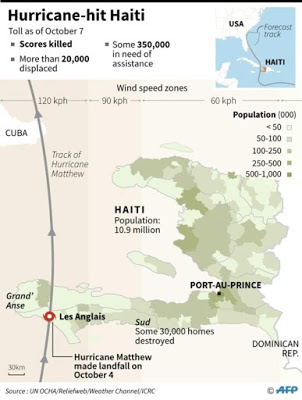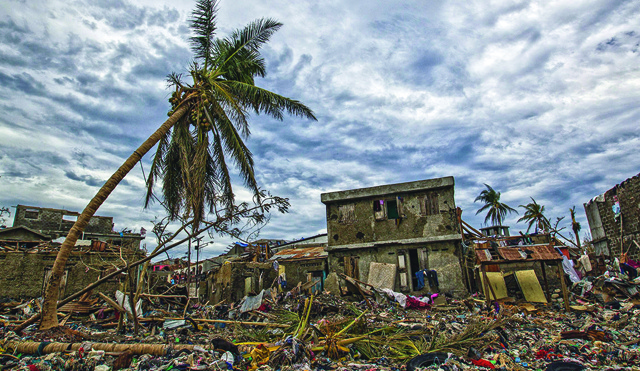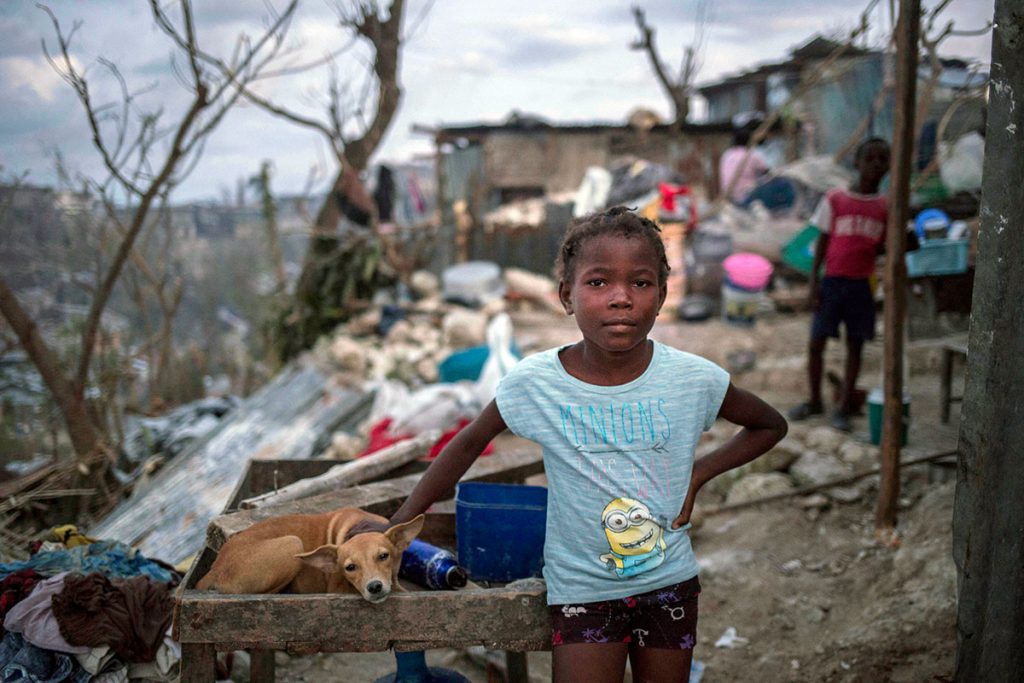Photo: LeMoyne/UNICEF
Update from 10Power: our solar assets in Haiti are intact and continue to generate clean energy. In the wake of the destruction created by Hurricane Matthew, we take inspiration from community mobilization and the resilience of the Haitian people. As a values based business providing access to solar, 10Power stands in support of Community Based Organizations. We highlight below some that are doing particularly good work.
The devastation wreaked by Hurricane Matthew in the departments of Sud, Grand’Anse, Nippes is estimated at over 1,000 dead, and 2.1 million affected. The latest OCHA figures state 1.4 million are in vulnerable situations in need of humanitarian aid and no less than 175,509 have been displaced. Rippling ramifications include a spike in cholera, higher prevalence of Zika and Malaria due to standing water, and the systemic humanitarian impacts of ecosystem destruction: s taple crops destroyed, livestock killed, trees uprooted.
taple crops destroyed, livestock killed, trees uprooted.
“Ernst Mathurin, director of GRAMIR, a Haitian NGO with over three decades of experience in the Grand Anse, recounted with horror the massive tree loss all across the region. Mathurin made a visit to Anse-à-Veau, to the west of Abricots. ‘There isn’t a plantain or a breadfruit tree left.’” [1]
Over 90% of crops have been destroyed, according to a preliminary assessment by the World Food Program. Goats, pigs and cows were killed in the storm. Livestock is an investment like a savings account, used to pay tuition, cover medical care or for funerals. Other livelihood means, including fishing boats and nets, were also annihilated. [2]
Immediate needs in the area are medical supplies, potable water and food. Second wave needs will be shelter and electricity. With relief efforts, is important to consider the long-term needs of the community, collaborate with local actors are and create positive feedback loops that will continue to provide benefit to Haiti.
As reported in the Financial Times, Maarten Boute, Chairman of Digicel, Haiti’s main cell phone provider, advised relief efforts on how to avoid the pitfalls experienced after the 2010 earthquake in Haiti. “How to help Haiti: source relief aid locally, buy our exports abroad, visit our beaches, invest in Haiti and its people,” he tweeted. [3]
Sourcing locally from the affected regions rebuilds economic stability. Cash aid directly to affected communities or local organizations is more effective than food or donation aid since roads have been cleared, the economy can begin circulating again.
Konbits – The Power of Community
Konbit is a Haitian Creole word for cooperative communal projects, whereby able-bodied folk gather to help each other.
Louino ‘Robi’ Robillard, the founder of Cite Soleil Peace Prize provides a powerful first person account of people traveling from the slums of Port Au Prince to the South to work side-by-side in solidarity with the most impacted communities, even though they are facing hardship in their own neighborhoods, which are located at sea level and experienced flooding. [4]
Supporting grassroots Konbit efforts ensures that resources are deployed effectively and efficiently, within the regional context, and gives locals the opportunity to re-invest in self-perpetuating, regenerative models, as opposed to one-time aid. There are few international organizations that have deep roots in the south of Haiti, those that are effectively navigating the remote terrain are co-operating with local leaders such as school directors, churches and farming cooperatives.
Rebuilding for Resilience Provides Protection from Climate Instability
As communities rebuild, there is an opportunity to pave permeable roads, which reduce flooding and replenish the water table; build stronger, green buildings; generate renewable energy, providing access to those who previously had none; distribute clean water; create closed-loop sanitation / compost systems; propagate sustainable agriculture; and create more stable income generation opportunities.
Investing in sustainable infrastructure creates resiliency to withstand storm systems and generates value.
Haiti has not experienced a category 4 storm since 1964, but with climate change, as melting sea ice merges with warmer waters, superstorms are predicted to increase in frequency and severity. According to NOAA, in reference to superstorm Sandy, “Climate-change related increases in sea level have nearly doubled today’s annual probability of a Sandy-level flood recurrence as compared to 1950.” [5] More intense storm systems in the future underscores the urgency to rebuild resilient systems today.
10Power strives to enable long-term change by supporting local organizations and businesses, and those international organizations that work closely with Haitians, that engage stakeholders, and procure and invest locally. In addition to our work developing and financing commercial and industrial solar projects, in August 2016 the 10Power team collaborated with Hope for Haiti (see below) and DigitalKap in the village of Morency in the Sud department. Through community outreach, we conducted solar education, market research, and conducted a feasibility study to support deployment of residential solar by a local provider.
At a town hall meeting the community ranked their top concerns:
- Economic opportunity
- Health services
- Roads
- Energy
Post-Matthew, while the short-term priorities of areas hit by the hurricane are weighted towards food, medicine and shelter, relief efforts should be building towards a long-term sustainable future, driven by the priorities of the community.
How to Contribute
The Haiti Advocacy Working Group has compiled a list of Best Practices for Hurricane Matthew Relief Aid. [6]
Organizations working in the affected areas that 10Power knows well
Haiti Communitere, established after the earthquake in 2010, is channeling resources through their community center, bringing local and international players together to provide logistical support and food for community clean-up and rebuilding initiatives.
Earthspark International / Enèji Pwòp has been operating a solar microgrid in Les Cayes, one of the cities directly in the path of the storm. More than 66% of the population in Haiti does not have electricity.
Doctors without Borders (MSF) is responding to Cholera and post Hurricane needs in underserved areas.
SOIL provides sanitation as a service. The local composting toilet organization is based in Port Au Prince but 100% of funds will go to delivery of emergency supplies to Jeremie by convoy.
Hope for Haiti has been active in the Les Cayes area for 25 years supporting education, nutrition and healthcare, clean water, infrastructure and economy.
J/P HRO Sean Penn’s organization in Haiti, well respected by locals, is mobilizing an emergency response team to work with partner organizations to respond to the needs of the hardest hit area.
Rebuild Globally is nonprofit that provides business development, education and job training to fight poverty in Haiti.
Singing Rooster supports Haiti’s small producers and reforest Haiti with income-providing crops, selling Haitian coffee, art, chocolate into international markets and returning 100% of proceeds to farmer and artist communities. Singing Rooster is raising funds for a partner cooperative in the south to rebuild their nursery.
Fonkoze offers micro-finance throughout Haiti and are fundraising to launch a response to cholera; rebuild branch offices; provide support to small businesses; address immediate needs of the ultrapoor; and enable borrowers to get back on their feet.
Sakala provides a safe space where youth come together to grow, learn, and play in the heart of Haiti’s largest underdeveloped area, Cite Soleil. They have been co-ordinating volunteers from Cite Soleil to do Konbits in the South.
Haitian Led Community Organizations and Networks
Paradis des Indiens is based in Abricots, an area hit hard by the hurricane, and is very well known for its high-quality community and educational work.
Edem Foundation is based on the beautiful island of Ile-A-Vache which suffered significantly in the storm, they are working with the local authorities to bring food, medical supplies and clean water.
Rebuild Petit Goâve. The Mayor of Petit Goave has partnered with the 1804 Institute to collect donations for the coastal commune of 12,000 people.
Haitian Health Foundation provides health, education and community development services to more than 100 impoverished mountain villages in and around Jérémie—improving the health and well-being of almost 250,000 residents.
Organization for Rehabilitation of the Environment (ORE), established in 1985 has been providing agricultural resources for women’s empowerment. They are working on relief in Camp Perrin and for farmers outside of Jérémie.
The Association des Maires de la Grand’Anse (AMAGA) is a network of Mayors in the region. They do not currently have a donation portal.
Medical Organizations Conducting Hurricane Matthew Relief Work
St Boniface Haiti Organization, established in 1983, runs a hospital and maternal health center in Fond-des-Blancs in Southern Haiti. They are a well respected organization in the area.
Heartline Ministries is a midwife organization out of Port Au Prince that has sent a team to the south and is partnering with grassroots organizations in the southern provinces of Sud and Grand’Anse, Christian Veterinary Mission and Mission Aviation Fellowship, to launch an emergency relief and recovery program.
Project Medishare, established in 1994, runs community-based and Haitian led programs to share knowledge and resources to improve health infrastructure and strengthen the skills of medical professionals.
NOVA is providing medical care, emergency shelter and food at their clinic in Cavaillon, near Les Cayes.
Ayti Air Ambulance provides helicopter ambulance service in the country of Haiti.
HERO (Haitian Emergency Response Operations) operates a private ambulance that handles most ground transport for Haiti Air Ambulance medevac flights.
International Organizations who support / fund local Haitian community organizations involved in relief
Grassroots International builds local capacity for sustainable livelihoods and resilience to climate change for the long-haul working closely with partners and allies – such as the National Peasant Movement of Papaye (MPNKP), Tet Kole, the Regional Coordination of Organizations of the Southeast, and the Haitian Platform to Advocate for Alternative Development (PAPDA).
Lambi Fund of Haiti is a respected organization providing sustainable development.
Haven has been working in Haiti since 2008 to facilitate the provision of sustainable water and sanitation, training and education, and shelter solutions.
HELP is based in Port Au Prince with relief efforts in Jeremie. They have been working for 20 years in Haiti providing students with scholarships for higher education.
Beyond Borders enables donors to sponsor a family on La Gonâve Island to get back on their feet.
Mennonite Central Committee is partnering with Ecumenical Foundation for Peace and Justice (FOPJ), and Sakala
Project Saint Anne is supporting the basic needs of children in Camp Perrin where 90% of infrastructure was destroyed.
Three Little Flowers Center has been supporting children in Fort Royal since 1987.
Unitarian Universalist Service Committee (UUSC) advances rights, economic and environmental justice. Sign a petition on their website demanding the US halt deportations to Haiti.
American Jewish World Service (AJWS) is a respected global organization collecting for Haiti.
Crowdfunding Sites
Fondation Aquin Solidarite (FAS) is a non-profit organization, founded in 2005, to provide educational, cultural, sports and economic support and mentoring to the city and the people of Aquin, located 117kms southwest of Port-au-Prince.
Hurricane Matthew Relief in Abricots is galvanizing support for cacao farmers in Abricots organised by dance scholar Dasha Chapman.
Donations for Jeremie are being collected through a local family with a good reputation.
Centre Communautaire de Kaykok is fundraising for the villagers of Kayok on Ile-A-Vache.
Western Union is offering toll free transfers to Haiti from United States, Canada , France, Chile, Brazil and the Caribbean at participating outlets, on their website and on mobile Western Union, where available.
Thank you to the compassionate humans who are seeking to contribute consciously.
Sources and Citations
1. “Rebuilding Haiti, One Commune at a Time,” Counter Punch
http://www.counterpunch.org/2016/10/11/rebuilding-haiti-one-commune-at-a-time/
2. “Hurricane Matthew leaves the farmers and fishermen of Haiti struggling to survive,” Miami Herald http://www.miamiherald.com/news/weather/hurricane/article107859937.html#storylink=cpy
3. Storm exacts heartbreaking toll in Haiti,” Financial Times
https://www.ft.com/content/85ff851a-8ca7-11e6-8cb7-e7ada1d123b1
4. “Seeing the Effects of Hurricane Matthew Up Close and Through a Different Lens,” Verite Sou Tanbou https://veritesoutanbou.wordpress.com/2016/10/12/seeing-the-effects-of-hurricane-matthew-up-close-and-through-a-different-lens/
5. National Oceanic and Atmospheric Administration
http://www.noaanews.noaa.gov/stories2013/20130905-extremeweatherandclimateevents.html
6. Haiti Advocacy Working Group
http://haitiadvocacy.org/wp-content/uploads/2016/10/HAWG-best-practice-post-hurricane-.pdf
Lists of Resources
- Institute for Justice and Democracy in Haiti http://www.ijdh.org/hurricane-matthew-relief/
- Effective Aid for Haiti https://www.facebook.com/EffectiveAidHaiti/?__mref=message_bubble
- Help Haitians, not the Disaster Capitalists,” Tillah Willah https://tillahwillah.wordpress.com/2016/10/07/help-haitians-not-the-disaster-capitalists/


